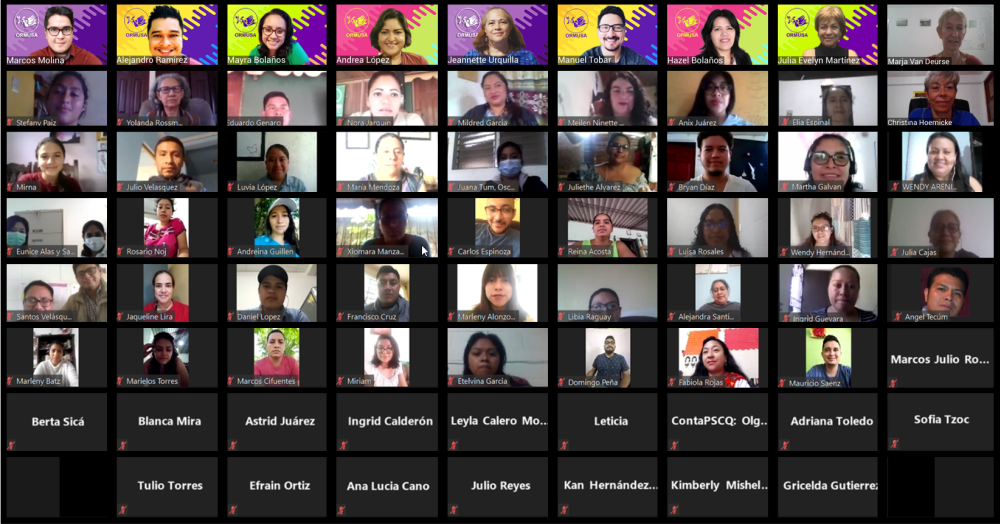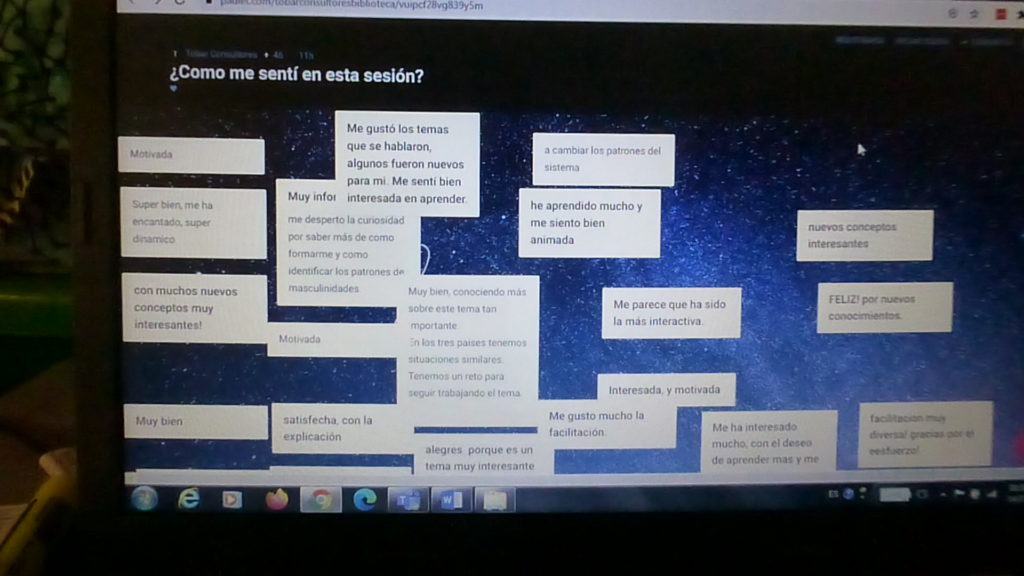Make Your Experiences Count. They Can Change the World.
LET’S BRING ALL OF OUR KNOWLEDGE AND EXPERIENCES TOGETHER.
TOGETHER WE KNOW MORE. TOGETHER WE ACHIEVE MORE. TOGETHER WE DO BETTER.
LET’S BRING ALL OF OUR KNOWLEDGE AND EXPERIENCES TOGETHER.
TOGETHER WE KNOW MORE. TOGETHER WE ACHIEVE MORE. TOGETHER WE DO BETTER.
Published: October 13, 2020
COVID-19 has put our world upside-down and the planning of the KNOW-HOW3000 activities in Central America was not spared either. We had to adapt to a new reality, which translated to diving into a virtual world.
A crucial challenge for 2020 was to follow-up on outcomes of the gender diagnosis that had been carried out last year among the Partner Organisations. One of the conclusions was that we apparantly have difficulties in driving projects that contribute to bridging the gender gaps that exist in various of our working areas.
The fight for gender equality regarding treatment and opportunities is fundamental for reducing poverty and for the construction of a democratic, sustainable and equal society. If we aim at contributing to an equal development, we have to assume more critical attitudes towards our own personal and collective behaviour, and we have to strengthen our capacity to turn our good intentions into actions.
We tried to make the best of the lockdown caused by the pandemic, and decided to organize an online course on gender. That’s the reason why we teamed up with ORMUSA (Women Organisation from El Salvador for Peace) and prepared a basic course titled Women and Men with a Shared Responsibility for a Good Living. The course covered ten webinars with a duration of two hours in a six week time period and included additional tasks for the participants as well as complementary material.
We’ve decided to run a webinar so that any person interested could take part, even though we were well aware of the restrictions that virtual meetings with a group that big and that diverse imply. It was quite a challenge for the facilitator team to present the topics in a dynamic and participative way – in some cases above all while dealing with technological issues that made communication and participation even more difficult.
The reactions to the course exceeded our expectations: 58 women and 36 men from 17 organisations participated. Some with a lot of previous knowledge, some at the beginning of their educational process regarding gender related topics.

On the KNOW-HOW3000 platform you can find the presentations (in Spanish) of each session with additional practical excercises and tip lists. In order to access it open the Docs from KNOW-HOW3000 Events then open América Central and 2020_Webinario Género.
All of the webinars were recorded and uploaded (in Spanish) on Google Drive on the same day (available there for one year): https://drive.google.com/drive/folders/1_6_y9Yv7RVwPJKrZx25K-i0ptAUu00uJ?usp=sharing
Topics addressed:
Webinar 1:
Subsystem sexes- gender.
Social construction of gender and power relations.
Webinar 2:
Including the gender focus in programmes and projects.
Webinar 3:
The economy of hygiene products.
The importance of joint responsability.
Webinar 4:
Patriarchal System.
Webinar 5:
Hegemonic masculinity and other concepts.
Webinar 6:
Micro-machismos.
Webinar 7:
Basic needs and strategic interests of gender.
Webinar 8:
Inclusive lenguage and non sexist language.
Webinar 9:
Misogyny.
Continuum of violence against women.
Webinar 10:
Gaps and challenges for gender equality and equity.
It is worth stressing that for HORIZONT3000 it was crucial that the addressing of each topic would involve some kind of self-reflection. Looking back, we can confirm that the course has resulted in more awareness among participants regarding their own behaviour on a personal and a professional level.
Here are some comments from the participants:
“These are very interesting topics that help us assume a different perspective regarding the cultural context that has been instilled in us – that way we realize that all women and men have the same rights.” (anonymous men)
“The social construction of gender and power relations is something new for me. It is ver important, since it helps us to switch perspectives of how we have culturally learned the roles of women and of men in a society and what each of them mean and imply.” (anonymous man)
“I find the topics very enriching for our professional education and even more so for our personal life. We have seen how we can include women as a subject of rights in our projects and how to value the tasks that we carry out in our homes.” (anonymous woman)
“I can use the information for my personal life, because it helps me to educate my children in a better way, since the education I received has always been strictly directed towards being a good housewife and not towards focusing on my professional life. I believe it is an opportunity for the younger generations to break the patterns of machismo that exists in various areas of our country.” (anonymous woman)
Speaking of gender, we also have to address masculinity and micro-machismos. ORMUSA highlighted that in the final report of the course the women talked about hegemonic practices in their organisations: “What stands out among them is that the masculine opinion is stronger represented and tended to, the coordination positions in the organisations are mostly held by men, to a smaller extent a salary gap as well as the absence of an institutional gender policy become apparent.”
We hope that addressing these topics creates more awareness of the importance of carrying out sensitization and learning processes with men on gender and masculinity topics and that it motivates organisations to include them in their agendas.
“It is fundamental to speak about the issue of masculinity, not only for us as collaborators of our organisations, but also because being aware of these issues, we can pass this knowledge on to our friends and also to coworkers in our projects. It is like a chain, if we do it right, we can see and note a change happening step by step. So the topic definitely enriched my knowledge and it will help me in my personal and professional life.” (anonymous man)
“To be honest, I found it very interesting getting to know more about these issues. However, how to address these issues in our communities was missing a bit, I think. I’ve listened to all of the different topics, but I didn’t feel comfortable enough to share my opinions, since the topics are quite new to me and I didn’t want to say anything that could be interpreted in the wrong way.” (anonymous man)
“I have learned new things about gender and that is important for my personal life, but even more so at work, since I directly collaborate with men and women from ten communities were the machismo is evident. Regardless of the topic I am going to facilitate, I always include gender equality, the house chores, the roles that can be assumed, the family’s participation and the satisfaction a person experiences, when being taken into account and receiving their families help.” (anonymous woman)
“What I found really interesting is the necessity of improving our understaning of how important the shared responsibility is – and this is even more difficult in rural areas. Nevertheless I figure that it is crucial to stress that this isn’t about women against men, quite the contrary: in the patriarchal system the man also loses, since he finds himself surrounded by restrictions that do not allow him a full life. That is something that is not mentioned often. The information generally is very centered around women and not around men.” (anonymous man)
“Within my context in the cultural environment, the image of men is painted as someone who doesn’t cry, who doesn’t feel pain and who doesn’t even have any kind of feelings. That’s why this session has been very important for me to work with the type of men who hide behind their aggression.” (anonymous woman)

The development projects that aim at the wellbeing of people have to be based on the fact that women and men play different parts in society – a society that is dominated by a patriarchal system and therefore they have different needs. If we ignore taking into account the different interests of women, men and other social groups, it could result in projects with outcomes that offer more benefits for adult men than for any other group. Consequently, addressing this issue was fundamental.
“There’s no doubt that the topic attracts our attention while working on the plannings that focus on mainstreaming gender strategies that can actually have results and do not only stay on paper. We have to review and analyse very well the strategic interests and practical needs. To conclude: in order to create changes in our societies and communitarian contexts, we have to fight the macho culture with actions that lead towards the transformation of gender roles. The key lies in applying these kind of actions in each and every area of life.” (anonymous woman)
As HORIZONT3000 we are facing the challenge of following up on the training processes and walking together with the organisations towards turning the concepts and learnings into specific actions to achieve real changes in the lives of women and men.